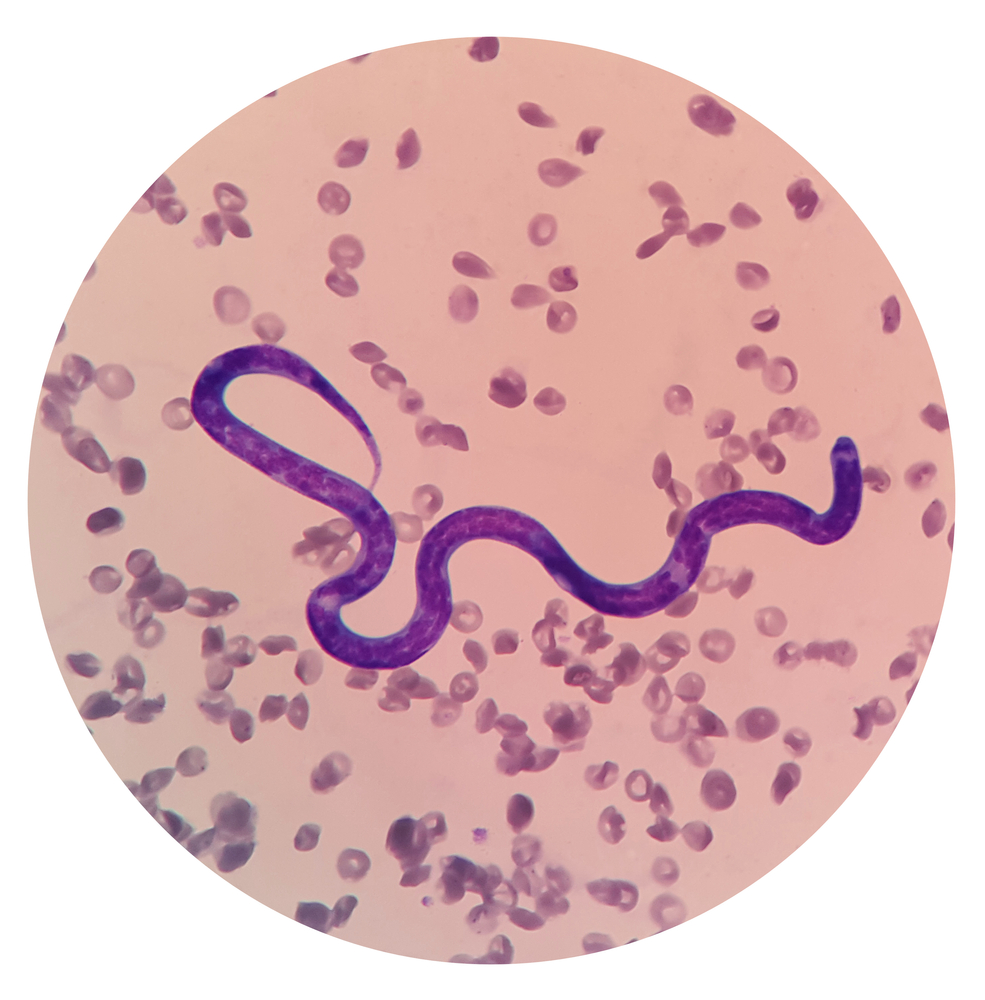Parasites commonly target pets, and can cause significant health issues for your pet. Our team at Pierson Pet Hospital wants to help by providing information about four common parasitic pet diseases, and suggestions for safeguarding your four-legged friend from these diseases.
Parasitic pet disease #1: Heartworm disease
Heartworm disease is spreading across the country, and states such as Michigan, which historically have had lower disease prevalence, are seeing increased case numbers. Factors pet owners should know about heartworm disease include:
- Transmission — Heartworms are transmitted by mosquitoes. When a mosquito feeds from an infected dog or wild canid, they ingest baby heartworms called microfilariae that reach an infective larval stage while in the mosquito, and can be deposited on your pet when the mosquito takes their next blood meal. The parasites travel through the bite wound to infect your pet.
- Signs — Heartworms affect cats and dogs differently, and they present with different signs.
- Dogs — Heartworms lodge in the dog’s pulmonary vasculature, causing inflammation and fibrosis that leads to a high pressure area. The heart must work harder to pump blood through this area, and over time, the heart loses the ability to effectively pump blood throughout the dog’s body, leading to heart failure. In the early stages, a dog may not show any disease signs, but then will exhibit a soft, persistent cough, lethargy, exercise intolerance, and a pot-bellied appearance as their condition progresses. Some dogs may suddenly collapse and die if the heartworms completely block blood flow through their heart.
- Cats — Cats are atypical heartworm hosts, and their immune system reacts strongly when the parasites invade. When the larvae reach the cat’s lung tissue, their immune system mounts a massive inflammatory response, resulting in a condition called heartworm associated respiratory disease (HARD) that causes difficulty breathing, wheezing, and coughing, and significantly damages the cat’s lung tissue. In severe heartworm cases, cats can die suddenly.
- Diagnosis — A blood test is needed to diagnose heartworm disease, and imaging techniques, such as X-rays and ultrasound, may be needed to confirm a diagnosis.
- Treatment — Treatment in dogs involves administering medications to kill the parasites at every life stage. This process takes several months and must be handled appropriately to prevent worm die-off complications. No treatment is available for heartworm disease in cats, who can only be managed, with a focus on supportive care, and decreasing the inflammation caused by the parasites.
- Prevention — Heartworm disease can easily be prevented by providing year-round heartworm prevention medication.
Parasitic pet disease #2: Tick-borne diseases
Tick-borne diseases, such as Lyme disease, anaplasmosis, ehrlichiosis, and Rocky Mountain spotted fever, can cause debilitating health issues for pets. Factors pet owners need to know about tick-borne diseases include:
- Transmission — Ticks found in Michigan, including the American dog tick, Lone star tick, brown dog tick, and the blacklegged tick, transmit tick-borne illnesses, but the tick typically must remain on your pet for about 24 hours to transmit disease.
- Signs — Signs can vary depending on the specific tick-borne illness, but typically include fever, lethargy, swollen lymph nodes, and joint swelling and pain.
- Diagnosis — Blood tests can determine if your pet has been exposed to a tick-borne illness.
- Treatment — Tick-borne diseases are typically treated with a particular antibiotic family, but the infection can be difficult to eradicate, requiring prolonged medication courses. Relapses are common.
- Prevention — Tick-borne diseases can be prevented by checking your pet for ticks after every outing, and providing year-round flea and tick prevention medication.
Parasitic pet disease #3: Intestinal parasites
Intestinal parasites, such as hookworms, roundworms, and whipworms, can cause serious health issues for pets, especially young and immunocompromised pets. Factors pet owners need to know about intestinal parasites include:
- Transmission — Hookworms, roundworms, and whipworms are transmitted when a pet ingests parasite eggs or larvae from the environment. In addition, hookworms and roundworms can be passed through the mother’s milk, and pets can be infected by eating an infected bird or small mammal.
- Signs — Signs vary depending on the parasite.
- Hookworms — Signs include diarrhea, pale gums, failure to thrive, and poor hair quality.
- Roundworms — Signs include diarrhea, a pot-bellied appearance, poor hair quality, coughing, and vomiting.
- Whipworms — Signs include intermittent diarrhea and bloody stool.
- Diagnosis — Your pet’s feces are examined to detect parasite eggs.
- Treatment — An appropriate dewormer is prescribed to address the parasite infection.
- Prevention — Many flea, tick, and heartworm prevention medications also provide coverage for intestinal parasites, so administering these medications year-round can protect your pet from intestinal parasites.
Parasitic pet disease #4: Sarcoptic mange

Sarcoptic mange is a contagious skin disease caused by the mite Sarcoptes scabiei, which burrow into a healthy pet’s skin to feed on the material in and on the skin. Factors pet owners should know about sarcoptic mange include:
- Transmission — Mange mites are transmitted through contact with an infected animal.
- Signs — Signs include excessive itching, hair loss, and self-inflicted wounds from scratching.
- Diagnosis — Sarcoptic mange is usually diagnosed with cytology on the pet’s skin scrapings.
- Treatment — Treatment involves certain topical medications for the pet, and eradicating the parasites from the pet’s environment.
- Prevention — Many flea and tick products offer protection from sarcoptic mites, so these medications, provided year-round, can protect your pet from sarcoptic mange.
Parasitic pet diseases are a concerning issue for pet owners, but providing year-round parasite prevention medications can protect your pet from many common parasites. If you would like your pet tested for a parasitic disease, contact our team at Pierson Pet Hospital, so we can ensure they are parasite-free.







Leave A Comment